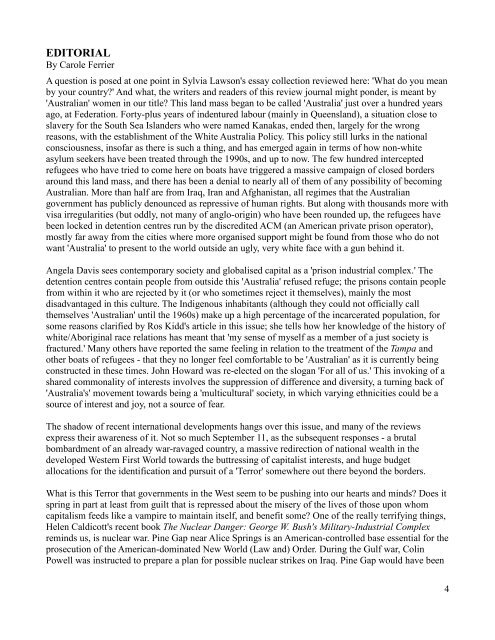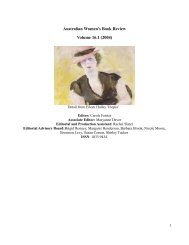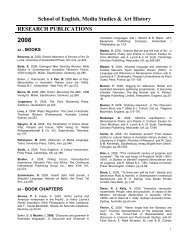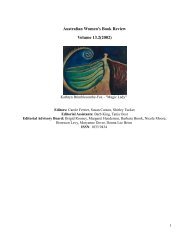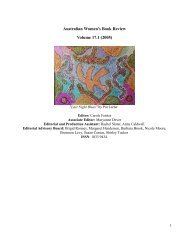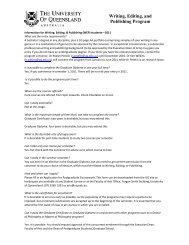Australian Women's Book Review Volume 14.1 - School of English ...
Australian Women's Book Review Volume 14.1 - School of English ...
Australian Women's Book Review Volume 14.1 - School of English ...
You also want an ePaper? Increase the reach of your titles
YUMPU automatically turns print PDFs into web optimized ePapers that Google loves.
EDITORIAL<br />
By Carole Ferrier<br />
A question is posed at one point in Sylvia Lawson's essay collection reviewed here: 'What do you mean<br />
by your country?' And what, the writers and readers <strong>of</strong> this review journal might ponder, is meant by<br />
'<strong>Australian</strong>' women in our title? This land mass began to be called 'Australia' just over a hundred years<br />
ago, at Federation. Forty-plus years <strong>of</strong> indentured labour (mainly in Queensland), a situation close to<br />
slavery for the South Sea Islanders who were named Kanakas, ended then, largely for the wrong<br />
reasons, with the establishment <strong>of</strong> the White Australia Policy. This policy still lurks in the national<br />
consciousness, ins<strong>of</strong>ar as there is such a thing, and has emerged again in terms <strong>of</strong> how non-white<br />
asylum seekers have been treated through the 1990s, and up to now. The few hundred intercepted<br />
refugees who have tried to come here on boats have triggered a massive campaign <strong>of</strong> closed borders<br />
around this land mass, and there has been a denial to nearly all <strong>of</strong> them <strong>of</strong> any possibility <strong>of</strong> becoming<br />
<strong>Australian</strong>. More than half are from Iraq, Iran and Afghanistan, all regimes that the <strong>Australian</strong><br />
government has publicly denounced as repressive <strong>of</strong> human rights. But along with thousands more with<br />
visa irregularities (but oddly, not many <strong>of</strong> anglo-origin) who have been rounded up, the refugees have<br />
been locked in detention centres run by the discredited ACM (an American private prison operator),<br />
mostly far away from the cities where more organised support might be found from those who do not<br />
want 'Australia' to present to the world outside an ugly, very white face with a gun behind it.<br />
Angela Davis sees contemporary society and globalised capital as a 'prison industrial complex.' The<br />
detention centres contain people from outside this 'Australia' refused refuge; the prisons contain people<br />
from within it who are rejected by it (or who sometimes reject it themselves), mainly the most<br />
disadvantaged in this culture. The Indigenous inhabitants (although they could not <strong>of</strong>ficially call<br />
themselves '<strong>Australian</strong>' until the 1960s) make up a high percentage <strong>of</strong> the incarcerated population, for<br />
some reasons clarified by Ros Kidd's article in this issue; she tells how her knowledge <strong>of</strong> the history <strong>of</strong><br />
white/Aboriginal race relations has meant that 'my sense <strong>of</strong> myself as a member <strong>of</strong> a just society is<br />
fractured.' Many others have reported the same feeling in relation to the treatment <strong>of</strong> the Tampa and<br />
other boats <strong>of</strong> refugees - that they no longer feel comfortable to be '<strong>Australian</strong>' as it is currently being<br />
constructed in these times. John Howard was re-elected on the slogan 'For all <strong>of</strong> us.' This invoking <strong>of</strong> a<br />
shared commonality <strong>of</strong> interests involves the suppression <strong>of</strong> difference and diversity, a turning back <strong>of</strong><br />
'Australia's' movement towards being a 'multicultural' society, in which varying ethnicities could be a<br />
source <strong>of</strong> interest and joy, not a source <strong>of</strong> fear.<br />
The shadow <strong>of</strong> recent international developments hangs over this issue, and many <strong>of</strong> the reviews<br />
express their awareness <strong>of</strong> it. Not so much September 11, as the subsequent responses - a brutal<br />
bombardment <strong>of</strong> an already war-ravaged country, a massive redirection <strong>of</strong> national wealth in the<br />
developed Western First World towards the buttressing <strong>of</strong> capitalist interests, and huge budget<br />
allocations for the identification and pursuit <strong>of</strong> a 'Terror' somewhere out there beyond the borders.<br />
What is this Terror that governments in the West seem to be pushing into our hearts and minds? Does it<br />
spring in part at least from guilt that is repressed about the misery <strong>of</strong> the lives <strong>of</strong> those upon whom<br />
capitalism feeds like a vampire to maintain itself, and benefit some? One <strong>of</strong> the really terrifying things,<br />
Helen Caldicott's recent book The Nuclear Danger: George W. Bush's Military-Industrial Complex<br />
reminds us, is nuclear war. Pine Gap near Alice Springs is an American-controlled base essential for the<br />
prosecution <strong>of</strong> the American-dominated New World (Law and) Order. During the Gulf war, Colin<br />
Powell was instructed to prepare a plan for possible nuclear strikes on Iraq. Pine Gap would have been<br />
4


